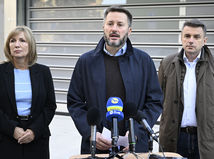– Jerry Coyne, Why do we need free-will compatibilism? , April 30, 2021
9. júla 2024 00:38,
Prečítané 243x,
kristian66,
Nezaradené
„As you know, “compatibilism” is the philosophical view that even though we cannot control our thoughts and actions beyond what the laws of physics dictate, and therefore have no “free will” in the traditional sense, we have free will in a nontraditional sense. Those “compatibilistic” varieties of free will vary among different philosophers; Dan Dennett has expounded several versions, and other philosophers still more versions (This all makes me wonder what we’re supposed to tell people what really constitutes our [compatibilist] “free will.”). Opposed to compatibilism are the two forms of incompatibilism that see free will as incompatible with physical law: a.) Contracausal free will. This is the traditional “you could have done/chosen otherwise” free will in which we are agents whose wills can effect, at a given time, two or more different behaviors or choices. It is the kind of free will that most people think we really have, and is certainly the basis of Abrahamic religions whose gods either save you or doom you based on whether you make the “right” choice about God or a savior. b.) Free will skepticism (sometimes called “hard determinism”). As you must know, this is the view to which I adhere. Though it’s often called “determinism”, with the implication that the laws of physics have already determined the entire future of the universe, including what you will do, that’s not my view. There is, if quantum mechanics be right, a fundamental form of indeterminism that is unpredictable, like when a given atom in a radioactive compound will decay. It’s unclear to what extent this fundamental unpredictability affects our actions or their predictability, but I’m sure it’s played some role in evolution (via mutation) or in the Big Bang (as Sean Carroll tells me). Thus I prefer to use the term “naturalism” rather than “determinism.” But, at any rate, fundamental quantum unpredictability cannot give us free will, for it has nothing to do with either “will” or “freedom”. And this question struck me, as my neurons chugged through their program this morning: Why do we even bother ruminating about compatibilism, much less write long books about it? To me the really important issues are a) vs. b) above, which in principle can be attacked with science, while compatibilism is more or less a semantic issue. If naturalism be true, then we should trumpet it from the rooftops, as it flies in the face of what most people think and (as I note below), does have real and important implications for society. But why bother so much with compatibilism? The only reason I can think of—and it’s a reason often voiced by philosophers—is that people need to have a definition of free will that comports with their “feeling” that they have contracausal free will, even if the definition itself isn’t contracausal. But why this need? Even I feel like I have contracausal free will, but I realize that at best it’s an illusion and, at any rate, I have no use for a philosopher-confected definition of some compatibilistic free will. I do just fine, thank you.“
 08.12.2024
08.12.2024
Vymlácený sklíčka z vitráží, a mříže rezavý. Starý oprýskaný nádraží, kde vlak už nestaví. Vajgly v květináčích a tuny prachu na římsách. Zarezlý výhybky, tvý starý sny, spí utopený v kopřivách. Kolikrát sis duši spálil, když´s ty sny chtěl vyrvat ven? Kolikrát se jiní smáli tvýmu boji s osudem. Kolikrát se jiní smáli a [...]
 08.12.2024
08.12.2024
V mokrém domě náhle cesta zastavena proudy deště jsou táhlé zmokla i má žena, v šeru a v temnotě kde ze stropu kape voda sedíme tiše nehnutě věříme, že se to poddá, raději i stan v tom domě máme obklopený kalužemi i ty těžké chvíle jsou staré známé požehnané mezi všemi, po noci však přijde den absolutnem vykouzlen my půjdeme s písní dál tou [...]
 08.12.2024
08.12.2024
zľakne sa a kľakne taktne tne do živého boha pustého človeka z kapusty ktorý mu skrz prsty uniká je to asi mnemotechnika v cmote chemoterapie diskordiána, ktorému sa otvára telesná schrána aby to riskol ten mord bude sa to diať stačí vytrimac príde zima nespokojnosti jeho velebnosti kata v cele smrti chcel by praštiť hlavou o zeď tak ho prosím z omylu vyveď




Celá debata | RSS tejto debaty